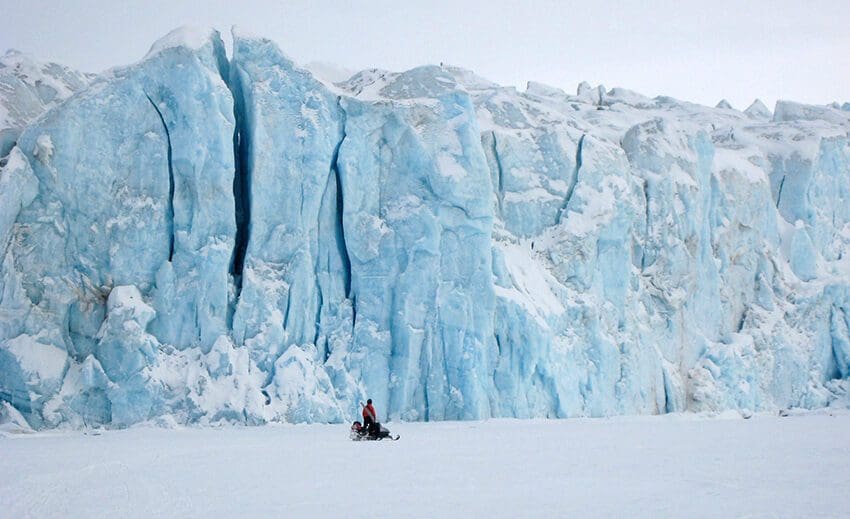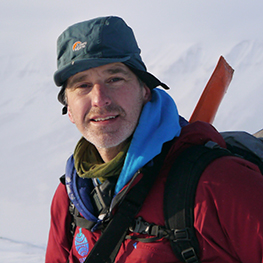AG-825 Glaciology (10 ECTS)
ID:
AG-825
CREDITS:
10 ECTS
APPLICATION DEADLINE:
October 15, 2023
START DATE:
January 08, 2024
END DATE:
February 23, 2024
COURSE PERIOD:
Spring semester (Block 1: Week 2-8)

Checking sea ice conditions in front of Tunabreen, a surging tidewater glacier. Photo: Mark Boon
| Grade: | Letter grade (A through F) |
| Course Cost: | None |
| Course Capacity Min/Max: | 10/24 students (AG-325/825 in total) |
| Language of instruction: | English |
| Examination support material: | Bilingual dictionary between English and mother tongue |
Course requirements
Enrolment in a PhD programme in glaciology or closely related discipline. Background in glaciology, physical geography and/or geology, although glaciology PhD students with other backgrounds will also be considered.
Academic content
The course uses the unique opportunities presented by Svalbard to better understand the characteristics, dynamics and likely fate of contemporary Arctic glaciers. A great emphasis is placed upon monitoring skills development. Lectures will describe how research in Svalbard has developed our understanding of thermally complex Arctic glaciers, and how climate change has strongly influenced this complexity. The impact of thermal change will be a recurring theme, and we will consider its influence upon ice dynamics and hydrological processes in particular. In this way, the relationship between climate, mass balance and glacier dynamics (including surging) can be explored in depth. Monitoring skills development will involve indoor workshops during the first part of the course and intensive field work during the second.
Learning outcomes
Upon completing the course, the students will:
Knowledge
- Have an advanced understanding of Arctic glaciological processes, based upon published material and first-hand experience.
- Have insight into different approaches to investigating Arctic glaciers using remote sensing and direct field observations.
- Understand the response of Arctic glaciers to climate change, and begin to appreciate how their mass balance, thermal characteristics and dynamics will change in future.
- Appreciate the importance and limitations of Arctic glacier monitoring during the winter season.
Skills
- Be able to incorporate key observational skills developed on the course directly into modern Arctic glaciology research.
- Have the ability to write and present a research grant proposal.
General competences
- Have logistical and organisational competence sufficient for conducting own fieldwork during the Arctic winter season.
- Be able to design and implement a short field programme as part of a team.
- Management and organization of data resources for scientific reporting.
- Be able to critically evaluate the published literature and identify how to improve the state of the science by tackling the observational challenges faced by glaciologists working in the Arctic.
Learning activities
The course extends for ca. 5 weeks including compulsory safety training, and is run in combination with AG-325 Glaciology (10 ECTS).
During the first part of the programme, the course will have a theoretical part with lectures, seminars, computer practicals and field day trips (weather permitting). Then we will conduct an intensive field programme upon two contrasting valley glaciers, followed by lab classes and workshops, wherein we develop communal data resources for the fieldwork reports. A separate workshop will be dedicated to research grant writing in glaciology. A further day trip will be used to ensure students witness more active tidewater glaciers, including surges (if accessible). Students will also have the opportunity to introduce their background and thesis at the start of the programme, and then to present the outcomes of the field programme (in groups) in the latter part of the course.
Summary
- Total lecture hours: 24 hours.
- Seminars: 6 hours.
- Lab/Exercise hours: 24 hours.
- Fieldwork or field excursions: 4–6 days.
Compulsory learning activities
All compulsory learning activities must be approved in order to sit the exam.
- All exercises
- Field training
- Excursions
Assessment
- All assessments must be passed in order to pass the course.
- Each assessment is graded, and subsequently combined into a single grade. Partial grades for each assessment will be available.
| Method | Length |
Percentage of final grade
|
| Research proposal | 2500 words | 40% |
| Field report | 2500 words | 60% |

